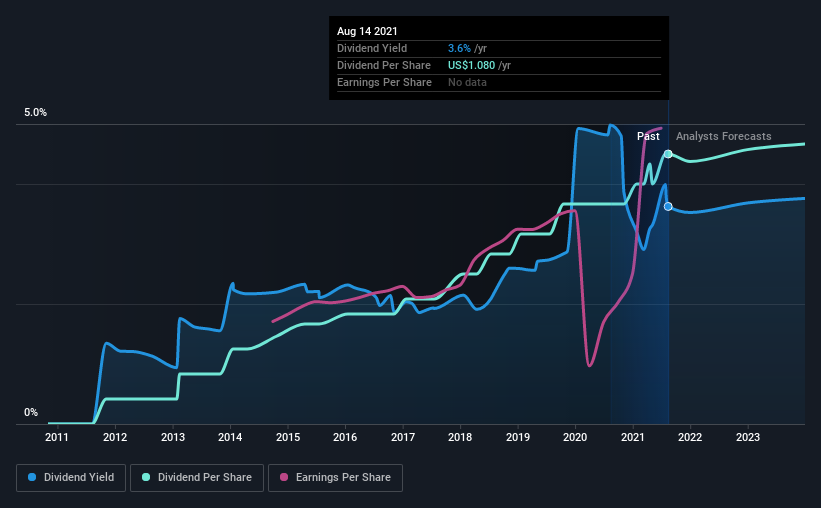There's A Lot To Like About Premier Financial's (NASDAQ:PFC) Upcoming US$0.27 Dividend
Readers hoping to buy Premier Financial Corp. (NASDAQ:PFC) for its dividend will need to make their move shortly, as the stock is about to trade ex-dividend. The ex-dividend date is one business day before the record date, which is the cut-off date for shareholders to be present on the company's books to be eligible for a dividend payment. The ex-dividend date is important as the process of settlement involves two full business days. So if you miss that date, you would not show up on the company's books on the record date. Meaning, you will need to purchase Premier Financial's shares before the 19th of August to receive the dividend, which will be paid on the 27th of August.
The company's next dividend payment will be US$0.27 per share, and in the last 12 months, the company paid a total of US$1.08 per share. Calculating the last year's worth of payments shows that Premier Financial has a trailing yield of 3.6% on the current share price of $29.79. If you buy this business for its dividend, you should have an idea of whether Premier Financial's dividend is reliable and sustainable. That's why we should always check whether the dividend payments appear sustainable, and if the company is growing.
Check out our latest analysis for Premier Financial
Dividends are typically paid from company earnings. If a company pays more in dividends than it earned in profit, then the dividend could be unsustainable. Fortunately Premier Financial's payout ratio is modest, at just 27% of profit.
Companies that pay out less in dividends than they earn in profits generally have more sustainable dividends. The lower the payout ratio, the more wiggle room the business has before it could be forced to cut the dividend.
Click here to see the company's payout ratio, plus analyst estimates of its future dividends.
Have Earnings And Dividends Been Growing?
Companies with consistently growing earnings per share generally make the best dividend stocks, as they usually find it easier to grow dividends per share. If earnings decline and the company is forced to cut its dividend, investors could watch the value of their investment go up in smoke. For this reason, we're glad to see Premier Financial's earnings per share have risen 19% per annum over the last five years.
The main way most investors will assess a company's dividend prospects is by checking the historical rate of dividend growth. Since the start of our data, 10 years ago, Premier Financial has lifted its dividend by approximately 27% a year on average. It's exciting to see that both earnings and dividends per share have grown rapidly over the past few years.
To Sum It Up
Has Premier Financial got what it takes to maintain its dividend payments? When companies are growing rapidly and retaining a majority of the profits within the business, it's usually a sign that reinvesting earnings creates more value than paying dividends to shareholders. This strategy can add significant value to shareholders over the long term - as long as it's done without issuing too many new shares. Overall, Premier Financial looks like a promising dividend stock in this analysis, and we think it would be worth investigating further.
On that note, you'll want to research what risks Premier Financial is facing. To help with this, we've discovered 1 warning sign for Premier Financial that you should be aware of before investing in their shares.
A common investment mistake is buying the first interesting stock you see. Here you can find a list of promising dividend stocks with a greater than 2% yield and an upcoming dividend.
This article by Simply Wall St is general in nature. We provide commentary based on historical data and analyst forecasts only using an unbiased methodology and our articles are not intended to be financial advice. It does not constitute a recommendation to buy or sell any stock, and does not take account of your objectives, or your financial situation. We aim to bring you long-term focused analysis driven by fundamental data. Note that our analysis may not factor in the latest price-sensitive company announcements or qualitative material. Simply Wall St has no position in any stocks mentioned.
Have feedback on this article? Concerned about the content? Get in touch with us directly. Alternatively, email editorial-team (at) simplywallst.com.

